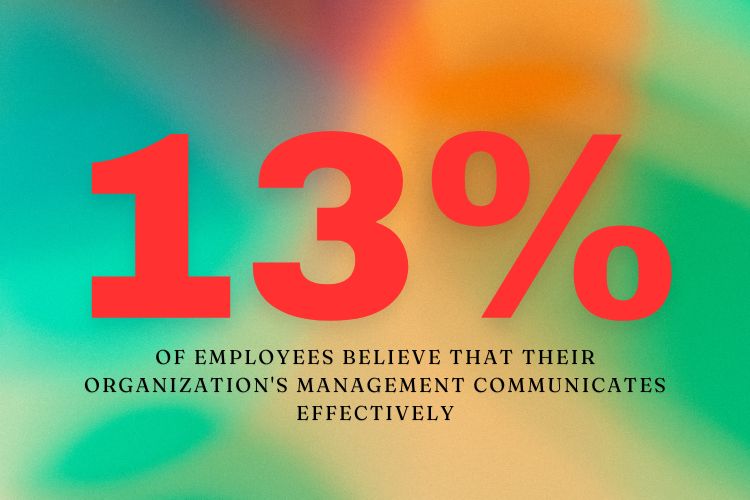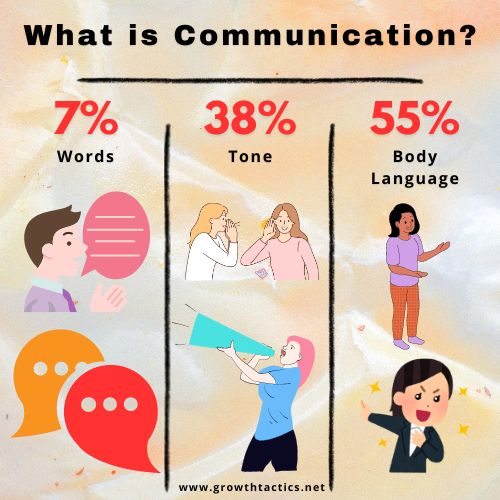In my 20-plus years of leadership experience, I’ve come to realize a fundamental truth that underscores the success of any team or organization: the importance of communication. Time and again, it has stood out as the linchpin in the intricate machinery of the workplace. Without good communication, the most well-oiled operations can grind to a halt, the strongest teams can fragment, and the brightest visions can dim.
It’s the thread that weaves through every aspect of leadership and teamwork, holding the fabric of productivity and job satisfaction together. Without it, everything falls apart, underscoring that mastering the art of communication is not just a skill but a crucial necessity in the world of work.

Jump To Section
Why is Communication Important in the Workplace?
In the complex ecosystem of the workplace, communication stands as the cornerstone that holds various components together. From coordinating daily tasks to setting long-term goals, the role of communication is both pervasive and paramount. Below, we explore the critical reasons why effective communication is essential in any work environment.
Facilitates Clarity and Direction
Effective communication ensures that all team members are on the same page. Clear directions and well-defined goals eliminate confusion and guide employees toward the achievement of organizational objectives. When leaders communicate effectively, they provide their teams with the clarity needed to perform tasks efficiently and make informed decisions, fostering a productive work environment.
Enhances Team Collaboration
Good communication fosters a sense of community and cooperation. It enables team members to share ideas, pool their resources, and work synchronously towards common goals. In environments where communication flows freely, collaboration thrives, resulting in innovative solutions and enhanced problem-solving capabilities. This synergy not only boosts productivity but also contributes to a more enjoyable and engaging workplace.
Builds and Maintains Relationships
Strong workplace relationships are built on the foundation of trust and open communication. Regular and honest exchanges not only help in building rapport among colleagues but also strengthen professional ties across different levels of an organization. When employees feel comfortable communicating, they are more likely to express concerns and contribute ideas, which can lead to improvements in processes and overall workplace morale.
Supports Conflict Resolution
Conflicts are inevitable in any social setting, and the workplace is no exception. Effective communication plays a critical role in conflict resolution by allowing parties to express their viewpoints and work towards a constructive resolution. Good communication skills ensure that conflicts are handled in a manner that respects all parties’ perspectives while fostering a solution-oriented approach.
Drives Better Decision Making
When communication is clear and comprehensive, decision-making becomes more effective. Access to complete and accurate information allows leaders and teams to weigh alternatives wisely and make decisions that are in the best interest of the company. Furthermore, involving team members in the decision-making process through open communication enhances their engagement and commitment to the execution of those decisions.
Cultivates a Positive Company Culture
Good communication in the workplace transcends operational aspects and helps in sculpting a positive company culture. A culture where communication is prioritized is often more dynamic, inclusive, and adaptive to changes. It encourages openness, supports diversity, and fosters an environment where employees feel valued and motivated.
The Impact of Good Communication Skills on Career Success
In a world where professional landscapes are continually evolving, the value of possessing strong communication skills has never been more critical. These skills, often considered soft skills, are crucial determinants of career success and progression. Here, we explore how good communication skills can profoundly impact one’s professional journey, propelling individuals toward greater achievements and fulfillment.
Enhances Professional Image
Good communicators are often perceived as more competent and confident. The ability to articulate thoughts clearly and listen actively can significantly enhance one’s professional image. It signals to colleagues, managers, and clients that you are engaged, prepared, and capable of handling responsibilities effectively. This positive perception can open doors to opportunities for career advancement and leadership roles.
Fosters Effective Leadership
Leadership is inherently about inspiring and guiding others toward a common goal. Effective communication is the tool through which leaders articulate their vision, motivate their teams, and navigate the complexities of organizational challenges. Good communication skills enable leaders to build trust, encourage collaboration, and instill confidence in their team members, all of which are essential for successful leadership.
Improves Networking
Networking is a powerful tool for career development, providing opportunities for mentorship, collaboration, and even job prospects. Good communication skills are the backbone of effective networking, enabling individuals to make meaningful connections, express their professional interests and goals, and leave a lasting positive impression. The ability to engage in insightful conversations and actively listen can transform casual encounters into valuable professional relationships.
Enhances Teamwork Efficiency
In any team setting, the success of the group relies on the seamless integration of different talents, perspectives, and work styles. Good communication skills facilitate this integration by ensuring that ideas are shared openly, feedback is given constructively, and conflicts are resolved amicably. This fosters a collaborative environment where each team member can contribute their best, driving the team toward its objectives more efficiently.
Facilitates Problem-solving and Innovation
In the face of challenges, the ability to communicate effectively can be a game-changer. Good communicators can articulate problems clearly, propose solutions, and persuade others of their viability. This skill set is invaluable in brainstorming sessions, strategy meetings, and any scenario where innovative thinking is required. Through effective communication, individuals can spearhead initiatives, navigate obstacles, and drive innovation within their organizations.
Bolsters Professional Adaptability
The ability to communicate effectively across various platforms and to diverse audiences demonstrates a high degree of adaptability—a trait highly valued in today’s globalized and ever-changing business environment. Good communication skills can help professionals navigate cultural differences, adapt to new work arrangements (such as remote or hybrid models), and embrace new technologies, all of which are crucial for maintaining relevancy and competitiveness in one’s career.
Improving Communication Skills: A Path to Develop the Skills Needed for the Workplace

In today’s fast-paced and interconnected professional landscape, the ability to communicate effectively is more than just an asset—it’s a necessity. Enhancing communication skills is a continuous journey, pivotal for career advancement and success. Here, we delve into practical strategies and considerations for developing the communication prowess required to thrive in the modern workplace.
Embrace Active Listening
Good communication starts with good listening. Active listening involves fully concentrating on what is being said rather than passively hearing the message of the speaker. It requires attention to body language, providing feedback, and refraining from forming a response while listening. By practicing active listening, individuals can better understand colleagues’ perspectives, build trust, and respond more effectively.
Cultivate Clarity and Conciseness
In the professional world, time is a precious commodity. Communicating your ideas clearly and succinctly without unnecessary jargon or verbosity can significantly enhance the effectiveness of your message. Whether it’s drafting an email or presenting in a meeting, prioritize clarity and conciseness to ensure your audience understands your message with minimal effort.
Understand Your Audience
Tailoring your communication to suit your audience is crucial. The approach you take when communicating with a close colleague may differ substantially from that with a new client or senior management. Consider the audience’s background, preferences, and level of understanding of the subject matter when choosing your words, tone, and form of communication.
Provide Constructive Feedback
Feedback, when given constructively, can foster personal and professional growth. Be specific, focus on the issue and not the person, and offer suggestions for improvement. Equally important is being open to receiving feedback. Viewing feedback as an opportunity for growth rather than criticism is essential for personal development and positive workplace relationships.
Practice Empathy
Empathy involves understanding and sharing the feelings of others. By empathizing with colleagues and clients, you can navigate conversations more thoughtfully, respond to feedback with grace, and handle conflicts more effectively. Empathy in communication fosters a more supportive and collaborative work environment.
Engage in Continuous Learning and Practice
Improving communication skills is an ongoing process that benefits from continued learning and practice. Attend workshops, seminars, and training sessions on effective communication. Seek opportunities to practice your skills in various settings—meetings, presentations, and even casual interactions. Receiving and acting on feedback is also a vital part of this learning process.
Leverage Technology Wisely
In the era of digital communication, mastering the art of conveyance through emails, social media, and other platforms is indispensable. However, it’s crucial to choose the right medium for your message. Consider the appropriateness of sending an email versus having a face-to-face conversation or a phone call, depending on the sensitivity and complexity of the information.
Overcoming Challenges in Workplace Communication
Effective communication in the workplace is crucial for the success and cohesiveness of any organization. However, several challenges can hinder this process, potentially leading to misunderstandings, conflict, and decreased productivity. Addressing these hurdles proactively is key to maintaining a healthy and efficient work environment. This section explores common communication challenges and strategies to overcome them, ensuring a smoother flow of information and interactions among colleagues.
Navigating Cultural Differences
In today’s globalized business environment, workplaces are increasingly diverse. Cultural differences can lead to communication barriers due to varying expressions, traditions, and interpretations.
To overcome these differences, promoting inclusivity and cultural awareness training can be beneficial. Understanding and respecting cultural nuances can pave the way for more effective communication and collaboration across diverse teams.
Dealing with Remote Communication Barriers
Remote work has become a staple in many organizations, particularly following the global shift prompted by the COVID-19 pandemic. This mode of working, though beneficial in many respects, can introduce significant communication challenges such as lack of non-verbal cues, technological dependence, and time zone differences.
To mitigate these issues, it’s crucial to rely on comprehensive digital tools and platforms that enhance connectivity. Regular virtual meetings, clear communication protocols, and an emphasis on responsiveness can help bridge the communication gaps inherent in remote working arrangements.
Bridging Generational Gaps
Workplaces often comprise multiple generations, each with its own set of values, communication styles, and technological aptitudes. This generational mix can sometimes lead to misunderstandings or miscommunications.
Addressing this challenge involves fostering an environment where different generations are encouraged to share their strengths and learn from each other. Workshops and team-building activities that promote intergenerational understanding and respect can also be effective.
Handling Information Overload
The digital age has led to an exponential increase in information flow. Employees often feel overwhelmed by the sheer volume of emails, messages, and data they receive, which can lead to missed information and communication fatigue.
To combat information overload, organizations can implement clearer communication policies, prioritize information dissemination, and encourage the use of tools that streamline communication and data management.
Managing Conflict
Conflict is a natural part of any workplace due to differing opinions and personalities. Poorly managed conflict can lead to a toxic work environment, whereas effectively managed conflict can lead to growth and innovation.
To effectively manage conflict, it is important to foster an open communication culture where employees feel safe to express concerns and disagreements. Training managers and team leads in conflict resolution and mediation techniques can also be invaluable.
Ensuring Clarity and Understanding
Miscommunication can lead to errors, wasted time, and frustration. Ambiguities in giving instructions or feedback can be particularly disruptive.
To improve clarity, always ensure messages are well-structured and clear. Encourage the practice of repeating back or summarizing what has been understood during conversations to confirm alignment. Visual aids and follow-up emails summarizing key points can also help reinforce understanding.
Conclusion
Developing strong communication skills is a journey that offers profound benefits in the professional realm. By embracing active listening, striving for clarity and conciseness, tailoring messages to the audience, providing constructive feedback, practicing empathy, engaging in continuous learning, and leveraging technology wisely, individuals can equip themselves with the competencies needed to succeed in today’s dynamic workplace. As such, investing in improving communication skills is not only beneficial but essential for professional growth and success.


